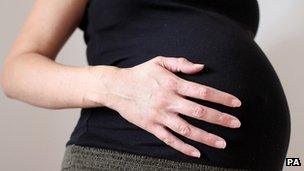MS symptoms 'eased' by pregnancy
- Published

Increased progesterone or oestrogen are thought to help symptoms during pregnancy
Researchers are carrying out clinical trials to find out if women with a range of autoimmune diseases could be helped by hormones found in pregnancy.
Women with a range of conditions, including multiple sclerosis, rheumatoid arthritis and thyroid disease report dramatic improvements in their symptoms during pregnancy.
However many say their conditions return, or worsen, after childbirth.
Two clinical trials are being held in France and California.
Researchers want to find out whether increasing levels of progesterone or oestrogen could protect women from relapses after childbirth.
The MS Society has welcomed the study but urged some caution.
Chief executive Simon Gillespie said: "This is encouraging. Some of the research going on, particularly the research in France at the moment, gives a potential clue and a potential way forward on treatments but long-term use of hormones is problematic. It does cause risks.
"So therefore the research needs to be done properly to identify what the benefits are and what the risks are before there can be any genuine therapeutic use."
The results from the French study are due in October.
Claire Oliver, 36, from Peebles in the Scottish Borders, is a mother to two boys aged 10 and three.
She was diagnosed with multiple sclerosis at the age of 19, but noticed a startling difference when she became pregnant for the first time, at 25.
"It was fantastic, almost like my symptoms completely disappeared," she said. "I felt completely well. Even after he was born I could lift him out, move him about the house, which I didn't think would be possible."
She enjoyed five years without a relapse, and when she became pregnant for the second time, found a similar effect.
'Big difference'
Lindsay Ross, a teacher from Aberdeen, is the mother of an eight-month-old baby boy. She has rheumatoid arthritis.
She said: "Before falling pregnant I had a lot of trouble with hand, feet and knee joints shoulders.
"On falling pregnant I did notice a big difference, really it seemed to disappear."
She added: "But six weeks after giving birth it did come back, slowly to begin with, then worse than ever."
Ms Ross is on a strong drug which is also used in the treatment of cancer, and hopes eventually a treatment will be found which is milder.
Anne Hart, a mother of two, lives in Fife. She was diagnosed with hypothyroidism in 2007.
This means the "under-active" thyroid gland in her neck does not produce enough of the thyroxine hormone.
She said: "It affects so many things but tiredness is the big one, weight gain or difficulty losing weight, always being cold - even in the summer I have the heating on, brittle nails, headaches."
However, a year after she was diagnosed, Ms Hart found her symptoms suddenly lifted.
She said: "To be given a break from it for nine months, you just wish there was some way you could get that every day, but without having to have another baby.
"It does make you wonder what is it in your body, is it the pregnancy hormone? How is this happening? It's hard having had that break from it for things to get worse again."
BBC Radio Scotland Investigates The Miracle of Pregnancy? will be broadcast on Sunday May 27, at 16:30.
- Published25 May 2012